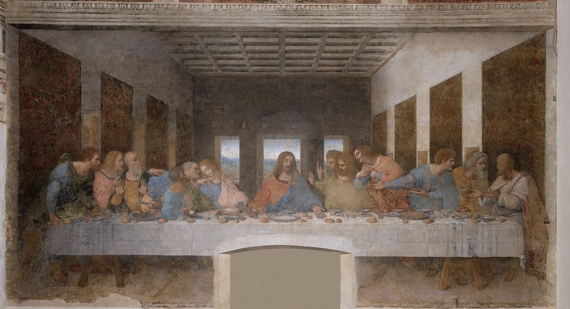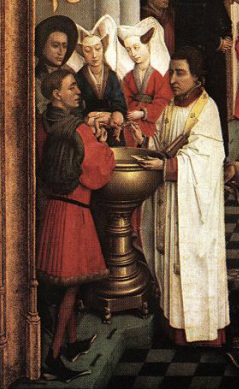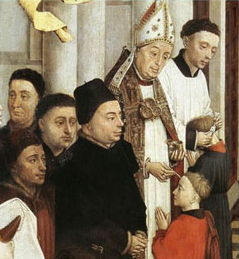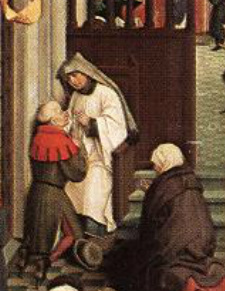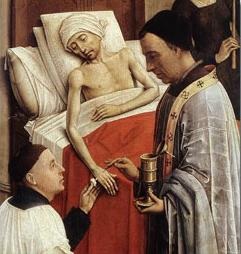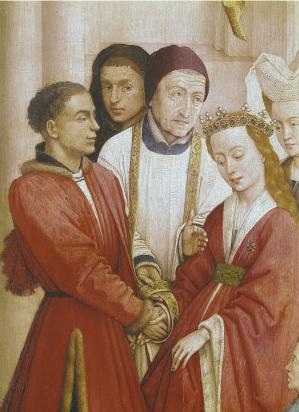The Sacraments
As Anglicans, we believe that the Sacraments are "sure witnesses, and effectual signs of grace, and God's good will towards us, by which he doth work invisibly in us, and doth not only quicken, but also strengthen and confirm our Faith in him."
- Article XXV of the 39 Articles of Faith
Similarly, the Outline of Faith (Catechism) in the 1979 Book of Common Prayer has this to say about the nature of the Sacraments:
Q. What are the sacraments?
A. The sacraments are outward and visible signs of inward and spiritual grace, given by Christ as sure and certain means by which we receive that grace.
Q. What is grace?
A. Grace is God's favor toward us, unearned and undeserved; by grace God forgives our sins, enlightens our minds, stirs our hearts, and strengthens our wills.
Q. What are the two great sacraments of the Gospel?
A. The two great sacraments given by Christ to his Church are Holy Baptism and the Holy Eucharist.
By tradition, there are seven "Sacraments". However, there are only two Sacraments which are ordained to us by Christ: Holy Baptism and the Lord's Supper. The church recognizes the other 5 as rites but Baptism and Lord's Supper have a clear and special significance.
Read the rest of the Articles of Faith here.
And read the rest of the Catechism here:
- Article XXV of the 39 Articles of Faith
Similarly, the Outline of Faith (Catechism) in the 1979 Book of Common Prayer has this to say about the nature of the Sacraments:
Q. What are the sacraments?
A. The sacraments are outward and visible signs of inward and spiritual grace, given by Christ as sure and certain means by which we receive that grace.
Q. What is grace?
A. Grace is God's favor toward us, unearned and undeserved; by grace God forgives our sins, enlightens our minds, stirs our hearts, and strengthens our wills.
Q. What are the two great sacraments of the Gospel?
A. The two great sacraments given by Christ to his Church are Holy Baptism and the Holy Eucharist.
By tradition, there are seven "Sacraments". However, there are only two Sacraments which are ordained to us by Christ: Holy Baptism and the Lord's Supper. The church recognizes the other 5 as rites but Baptism and Lord's Supper have a clear and special significance.
Read the rest of the Articles of Faith here.
And read the rest of the Catechism here:
| |||||||
|
Holy Baptism
Jesus commanded us, after his resurrection, to go "to all peoples everywhere and make them my disciples: baptize them in the name of the Father, the Son, and the Holy Spirit" (Matthew 28:16-21). Through water and in the name of the Father, the Son, and the Holy Spirit, we Baptize our people, which absolves us of our sins and brings us into the fullness of Christ's Body, the Church, and makes us inheritors of the kingdom of God. The outward sign of Baptism is water. However, the inward and spiritual grace in baptism is the union with Christ. In being Baptized we are required to renounce Satan, repent of our sins, and accept Jesus as our Lord and Savior. Read more about Baptism here. The Holy Communion
Holy Communion, sometimes called Holy Eucharist or Lord's Supper, is the Divine Liturgy and Mass, which was instituted by Jesus at the Last Supper on the night in which he was betrayed: He said, “Do this in remembrance of me” (1 Corinthians 11:24, Matthew 26:20-28; Mark 14:17-25; Luke 22:14-20). This sacrament is commanded by Christ for the continual remembrance of his life, death, and resurrection, until his coming again. By this Sacrament Jesus feeds His people with His Body and Blood (John 6:41-59) and we believe He is truly present when we partake of this Sacrament. Why is Holy Communion is called a sacrifice? Because the Eucharist, the Church's sacrifice of praise and thanksgiving, is the way by which the sacrifice of Christ is made present, and in which he unites us to his one offering of himself. This Sacrament benefits us inasmuch as it grants the forgiveness of our sins, the strengthening of our union with Christ and one another, and the foretaste of the heavenly banquet which is our nourishment in eternal life. As we come to partake in the Lord's Supper, it is required that we examine our lives, repent of our sins, and be in love and charity with all people. At Saint James' Church, we celebrate this Sacrament every week at 10:45 A.M. The other Sacraments: Confirmation As mentioned earlier, Baptism brings us into the fullness of Christ's Church. Confirmation, through the laying on of hands by a Bishop, carries the strengthening gifts of the Holy Spirit for life as a mature Christian (Acts 8:14-17; 19:1-7; Ephesians 1:13). Those who were Baptized as infants are given the opportunity to accept their faith and those who were Baptized as adults are able to expand their relationship with Jesus through His church. Of those desirous of being Confirmed, it is required that they have been baptized, are sufficiently instructed in the Christian Faith, are penitent for their sins, and are ready to affirm their confession of Jesus Christ as Savior and Lord. Penance Sometimes called "Confession", Penance allows believers who have fallen into sin to be reconciled and to return God. A priest can be called upon to offer counsel and to affirm God's forgiveness as well as the grace of Absolution. While not specifically required by the Church, Confession of sins is a great benefit given to us by God. It allows us to become clean again, relieving the great stress that sin carries. Additionally, Confession holds us accountable before God and keeps us striving to be best we can be. All sins can be confessed, not just ones we feel are "really bad" and all people are encouraged to make their Confession regularly. (John 20:23; James 5:16) Holy Unction Also called the "Anointing of the Sick", is a means by which people who are afflicted in body, mind and soul can be healed. While the Anointing is many times administered at the time of death, it is a sacrament that is available at all times. It is comprised of the following:
Holy Matrimony Holy Matrimony, commonly called "marriage" or a "wedding", is the life-long union of one man and one woman before God. The relationship, as St. Paul tells us, is like that between Christ and His Church (Matthew 19:4-6, Ephesians 5:31-32). According to the Book of Common Prayer 1979, Marriage: Signifies to us the mystery of the union between Christ and his Church, and Holy Scripture commends it to be honored among all people. The union of husband and wife in heart, body, and mind is intended by God for their mutual joy; for the help and comfort given one another in prosperity and adversity; and, when it is God’s will, for the procreation of children and their nurture in the knowledge and love of the Lord. Therefore marriage is not to be entered into unadvisedly or lightly, but reverently, deliberately, and in accordance with the purposes for which it was instituted by God. Read more about the wedding service here. Holy Orders Ordination is the rite in which God gives authority and the grace of the Holy Spirit to those being made bishops, priests, and deacons, through prayer and the laying on of hands by bishops. All baptized Christians are called to service in the Church in one way or another. Since the earliest days, the Church has ordained people who have been called by God into three distinct orders of ministry: bishops, priests, and deacons. These three groups have specific roles to play within the church. Bishops are the direct line of Apostolic Succession. They supervise the life of the Church and guard its faith in their respective jurisdictions called Dioceses. Priests serve under bishops as pastors and ministers of the faith and are responsible for the sacramental life of the Church within their parish and surrounding community. Deacons usually have a specific ministry which is their primary focus. For example, serving those in need, leading a youth group, etc. Deacons also assist bishops and priests in ministry and in the administration of the sacraments. Is God's activity limited to these rites? No. God does not limit himself to these rites; they are patterns of countless ways by which God uses material things to reach out to us. |
Images taken from
The Last Supper by Leonardo da Vinci and Seven Sacraments Altarpiece, by Rogier van der Weyden 1445-50 |
